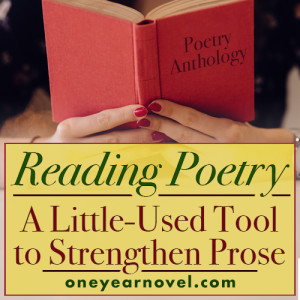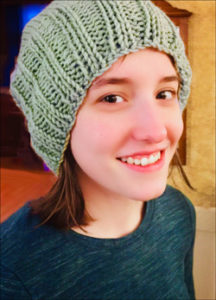Reading Poetry: A Little-Used Tool to Strengthen Prose
 By Gabrielle Schwabauer, Staff Writer
By Gabrielle Schwabauer, Staff Writer
I’ve been a reader of both fiction and poetry for almost as long as I can remember. As a small child, I used to pull out the riddle-poems from The Hobbit like party tricks whenever I met a new adult. My father read to me from The Tales of Winnie-the-Pooh, humming:
The more it snows (Tiddley pom)
The more it goes (Tiddley pom)
The more it goes (Tiddley pom)
On snowing.
When I read The Fellowship of the Ring, I committed Tom Bombadil’s verses to memory, and then the verses about Gil-Galad, and then I started working on the Lay of Eärendil. I devoured Redwall, in which young warrior mouse Matthias can only save his beloved abbey by deciphering the poem left behind by Martin the Warrior. I brought stacks of Magic Tree House books home from the library, piecing together poem-clues with Jack and Annie from the mysterious Morgan Le Fay. Poems were hidden jewels I could slip from between the pages and tuck into my pocket for some future dismal day.
Not everyone agrees. I have heard many people admit, “I always skip the poems.” Devout readers might attend to a poem if it’s integral to the plot, but few writers actually seek out poems outside of the context of story.
It’s a shame, because the study of poetry can benefit any fiction writer.
Why?
Well . . .
1. Poems train your ear to hear what sounds “right.”
The characters in my first novel were cardboard cutouts scraping their flimsy feet on the page; my plot was a patchwork quilt of mismatched scenes stitched together by sheer willpower. But right from the get-go, my prose was actually pretty good!
Partly because I had read so many novels, of course, but also because I had read so much poetry. The more I mouthed the strict meter of Robert Frost, or chanted the rollicking rhymes of May Swenson, or wandered through the up-and-down cadence of Dylan Thomas, the more I understood how to tweak the words in a sentence or paragraph to make them pleasing to the ear.
Truth be told, it’s hard to articulate exactly how one “knows” what sounds good in a sentence or phrase. One might practice by paying special attention to syllable counts, vocal inflections, and alliteration, but enough exposure to poetry can take these conscious analyses and move them into the realm of the subconscious. Even free verse, after all, relies heavily on beats and pauses to communicate meaning. Understanding the sound of poetry will help you to understand the sound of prose.
2. Poems practice precision.
One of the biggest problems I see in student novels is vague language, which creates vague imagery. Without precision, your story takes place against a blurred and foggy background.
Early novels tend to be riddled with verbs like “be,” “do,” “have,” and “go,” often shadowed by bland and obvious adverbs. These words are sometimes necessary, of course, but too often they’re a symptom of the writer’s inability to focus the lens of the story-camera on the scene. If you need a classroom of kindergarteners to get from Point A to Point B, it’s much more interesting for them to “meander” down a farmhouse road, “march” down a city street, or “jostle” in the hallway than to simply say “they went.”
Good poets are masters of this kind of precision. In a poem, every word matters; not one unnecessary phrase can be allowed to live. With limited space—and often rules about syllable count, rhyme scheme, and rhythmic pattern—poets are forced to condense. Take three sentences; compress them into one. Take three words; compress them into one.
In one of my recent poems, I used shedding, pockmarked, furrows, lapping, cascades, collide, embedded, arcing, scramble, and many other unusual nouns and verbs. I am by no means a poetry master—and that’s my point! Working within syllable constraints forced me to cut the fluff and find shorter, more specific ways to say what I meant.
Which leads me to my final point:
3. Poems say a lot by saying very little.
In fiction, it’s tempting to slap readers in the face with backstory details, crucial emotions, and lessons learned. Inexperienced authors tend to overshare, generalize, and make sweeping, dramatic statements.
Similarly, one of the hallmarks of the inexperienced poet is her tendency to use broad language to convey broad ideas. She writes about her best friend like so:
My friend is always there for me,
She always understands.
She doesn’t leave when hard times come,
And reminds me of God’s plans.
The skillful poet knows how to focus. She transports us to her living room as she breaks down in tears, and her friend sits down beside her and clasps her hand. Then the poem ends. The reader will understand that this gesture symbolizes the consistent support Friend always offers Poet, and her quiet understanding of just what Poet needs in her grief.
Fiction writing is much the same. Weaker stories tell the reader what to feel, and how to feel it, and why it is so important that he be indignant or jubilant or seething right now. Stronger stories lead the reader into a scene that makes him flare up with indignation, or do a victory dance around the kitchen, or grit his teeth in frustration.
It’s bigger than “Show, don’t tell.” It’s “Don’t show everything.” Learn how to plant clues and symbols and meaningful glances so that when our heroine’s father says “I’ll be leaving early for the office tomorrow,” the reader knows he really means “Your mother and I are getting a divorce.” When Jimmy’s escaped dog comes home, it really means that he’s going to be okay living in Kentucky from now on. When Chantrelle helps her little brother up after he falls in the mud, it really means that she’s finally overcome her guilt.
Reading poetry is a gateway to the art of implication. And yes, I said reading. Writing poetry is excellent practice, but it’s not an excellent start. If you really want to benefit from these techniques, you have to absorb them first.
I highly recommend purchasing poetry compilations rather than only reading the collected poems of a few specific writers, as you’ll benefit from exploring a wide variety of styles and subjects and time periods. College poetry textbooks are a great place to start, since they’re chock-full of poems, and you can often find a few older editions at used bookstores. My personal favorite is An Introduction to Poetry, compiled by X. J. Kennedy.
So, as you venture out into the world of verse, learn from modern poets and Romantic poets and poets who were once slaves. Read poems about spelunking and poems about dead pets and poems about writing poems. Stuff your mind full of interesting verbs; get used to thinking sideways. Then, when you sit down at your desk to type out Chapter 1 of your new novel, some of that clutter might dislodge and come spilling onto the page.
…
Do you have any favorite poems or poetry collections?
…
 About Gabrielle
About Gabrielle
Gabrielle Schwabauer has loved stories for as long as she can remember. (The Lord of the Rings holds the top spot, as it has for fifteen years running.) She likes reading books, playing video games, eating sandwiches, looking at pictures of borzoi, and having already written today.



This post has really inspired me to think outside the box a little more, Gabrielle. I’ve always had a kind of love/hate relationship with poetry. When I was younger, I couldn’t stand the stuff. But then I discovered Tolkien’s poems and learned that I actually can enjoy poetry. I’ve become more interested in writing poetry, too. Lately, I haven’t really read much, but I’m feeling challenged to seek some out now. Thanks, Gabrielle!
“Don’t show everything.” Brilliant. I needed this. Thank you.